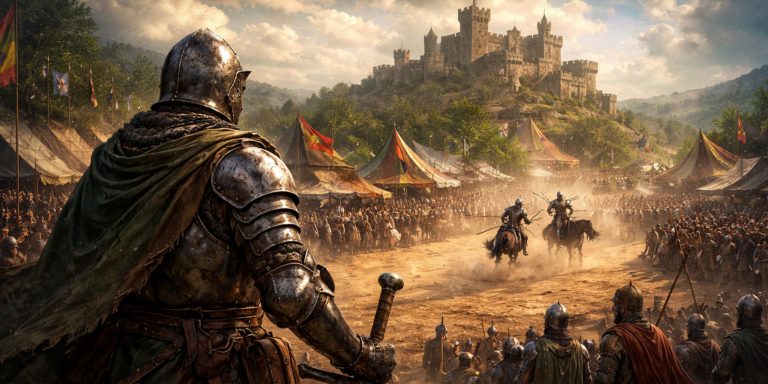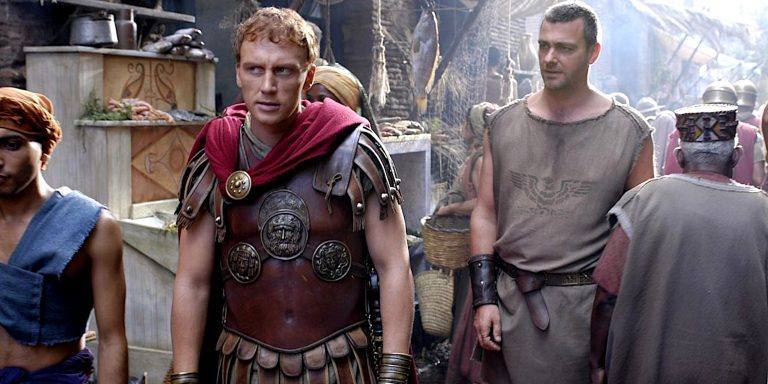
Few characters in Spartacus managed to command attention quite like Lucretia. Played by Lucy Lawless with that unnerving mix of vulnerability and venom, she wasn’t a warrior, a slave, or a gladiator. Yet somehow, she wielded more power than most of them. In a world soaked in blood and betrayal, Lucretia proved that survival didn’t always come from the blade. Sometimes, it came from the bed, the banquet table, and the perfectly timed smile.
The Woman Behind the Domina
Lucretia’s role as domina of the House of Batiatus placed her at the centre of Capua’s social and political life. She was born into privilege but constantly reminded of her precarious position. Her husband’s ambitions were risky, their finances unstable, and their allies unreliable. But rather than collapse under the pressure, Lucretia turned the game in her favour.
She wasn’t content to be the ornamental wife standing behind her husband. She was an operator, pulling strings with poise. Every compliment, every sip of wine, every glance across a dinner table carried intent.
If you looked closely, you could see it: she wasn’t reacting to her world, she was designing it.
Charm as a Weapon
Where gladiators used swords and shields, Lucretia used charm and performance. She understood the men who surrounded her, how easily their egos could be flattered, how their appetites could be weaponised.
Take her friendship with Ilithyia, for example. What started as a social alliance evolved into one of the most complex psychological power plays in television. It was love, loathing, jealousy, and dependence all wrapped into one toxic package. Lucretia didn’t just survive Rome’s double standards, she exploited them.
Her power was quiet, but lethal. When she poured wine, people listened. When she smiled, men hesitated. That was her battlefield.
The Politics of the Arena
The gladiatorial world of Spartacus was brutal, and not just for those fighting in the sands. Every match was a political move, every patronage a gamble. Lucretia’s involvement in these politics was essential to the success of Batiatus’ ludus.
She was the bridge between Capua’s elite and the bloodied sands below. She knew which noble to flatter, which enemy to distract, and when to lean into the role of the loyal, grieving wife. Her influence extended beyond the villa walls and into the minds of the Roman elite.
Without her, the house of Batiatus might never have risen so high, or fallen so spectacularly.
Loyalty, Betrayal, and Tragedy
Lucretia’s loyalty to her husband was complicated. She loved him, yes, but she also loved power, status, and the intoxicating control that came with them. As their schemes grew darker, she followed him down the spiral, even when the cost was too high.
Her descent in Gods of the Arena and Vengeance is both horrifying and tragic. She becomes a ghost of herself, driven by obsession, revenge, and loss. It’s haunting to watch her unravel, yet impossible to look away.
By the end, Lucretia isn’t just a symbol of corruption. She’s the embodiment of survival in a world that devours women who don’t play by its rules.
Legacy of a Domina
Lucy Lawless brought a theatrical intelligence to Lucretia that made her unforgettable. She made her wickedness human, her cruelty almost sympathetic. In a series full of warriors, Lucretia proved that the deadliest figures often never touched a sword.
She’s the quiet force that shaped the politics of Spartacus and redefined what power could look like in a world built on spectacle and suffering.
It’s ironic that in a show famous for its blood and muscle, one of its most dangerous players wore silk and pearls.
Seven Swords Takeaway
Lucretia wasn’t the strongest or the bravest. But she might have been the most real. Every choice she made, good, bad, or utterly deranged, came from a desperate will to matter in a world that treated women as decoration.
If Spartacus represented rebellion from the chains of slavery, Lucretia represented rebellion from the limits of womanhood in Rome. And she did it with perfect posture.
Watch the trailer:










